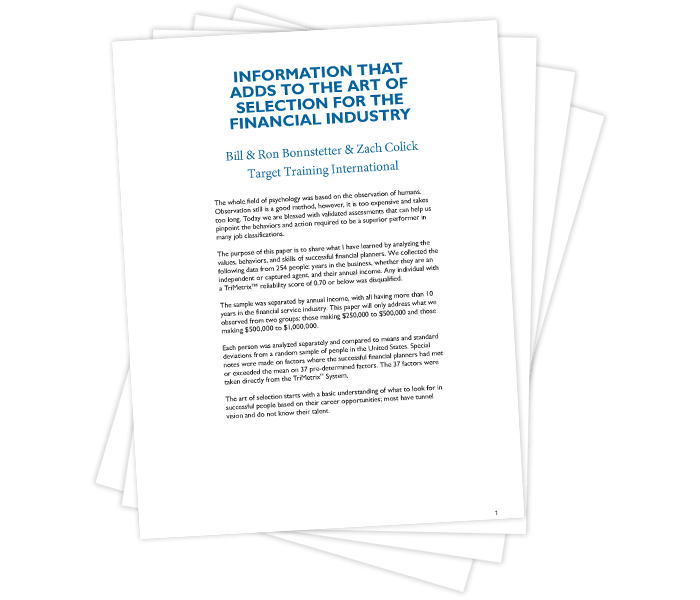
Feb 17, 2022
The most successful financial planners are those that possess a high level of versatility and are able to easily adapt to change. They understand people very well, but they are also very focused on attaining good results. Because of the nature of their business, they are very structured and adhere to financial systems. They understand their roles and take pride in their work. While they focus on the present, many have the drive to further advance their careers and become even more successful.
The information presented in this paper to observe successful and un-successful financial planners. These observations will also carry over into other sales fields.

Jun 29, 2021
This study suggests that for a variety of reasons, male and female students do not bring in the same sets of soft skills into a college classroom. The impact of their educational experiences on male and female students is different.

May 13, 2021
Our regularly updated adverse impact studies provide evidence that our assessments offer equal opportunities for all protected groups. This Equal Employment Opportunity Commission (EEOC) definition includes: gender, race, disability and Veteran status.

May 4, 2020
To prosper in the Industry 4.0 ecosystem, individuals and organizations will be required to develop 21st century skill sets. This research seeks to identify emerging trends, pinpoint challenges and gain data-driven insights into the forces shaping the technical talent pipeline of Industry 4.0 in the United States. To successfully navigate the Industry 4.0 environment (and beyond), organizations will need to integrate four different generations (soon to be five) in their workforce. Next-Generation Leaders were found to be lacking in creativity and innovation and conceptual thinking, critical skills required in navigating an Industry 4.0 environment. This should serve as a wake-up call to educators tasked with overhauling an antiquated system, particularly at the graduate level. Based on responses to a series of questions using the TTI TriMetrix DNA assessment suite a data-driven, validated assessment instrument, this research presents an overview of the development of 25 professional competencies that contribute to superior performance.

May 4, 2020
Effective interdisciplinary research (IR) teams require skills of collaboration, sharing, and abilities to integrate knowledge from diverse disciplines. Pre-post data was collected using three learning modules designed to support the development of collaboration and teamwork skills in the context of IR. Results showed (1) participants learned and practiced essential collaborative skills in authentic contexts; (2) training modules were valued and helped participants recognize the important role that personal dispositional characteristics have on IR teams; (3) participants’ confidence in adapting to differences among team members increased; and (4) participants recognized that effective collaboration requires intentionality. This paper also introduces the concept of dispositional distancing.




